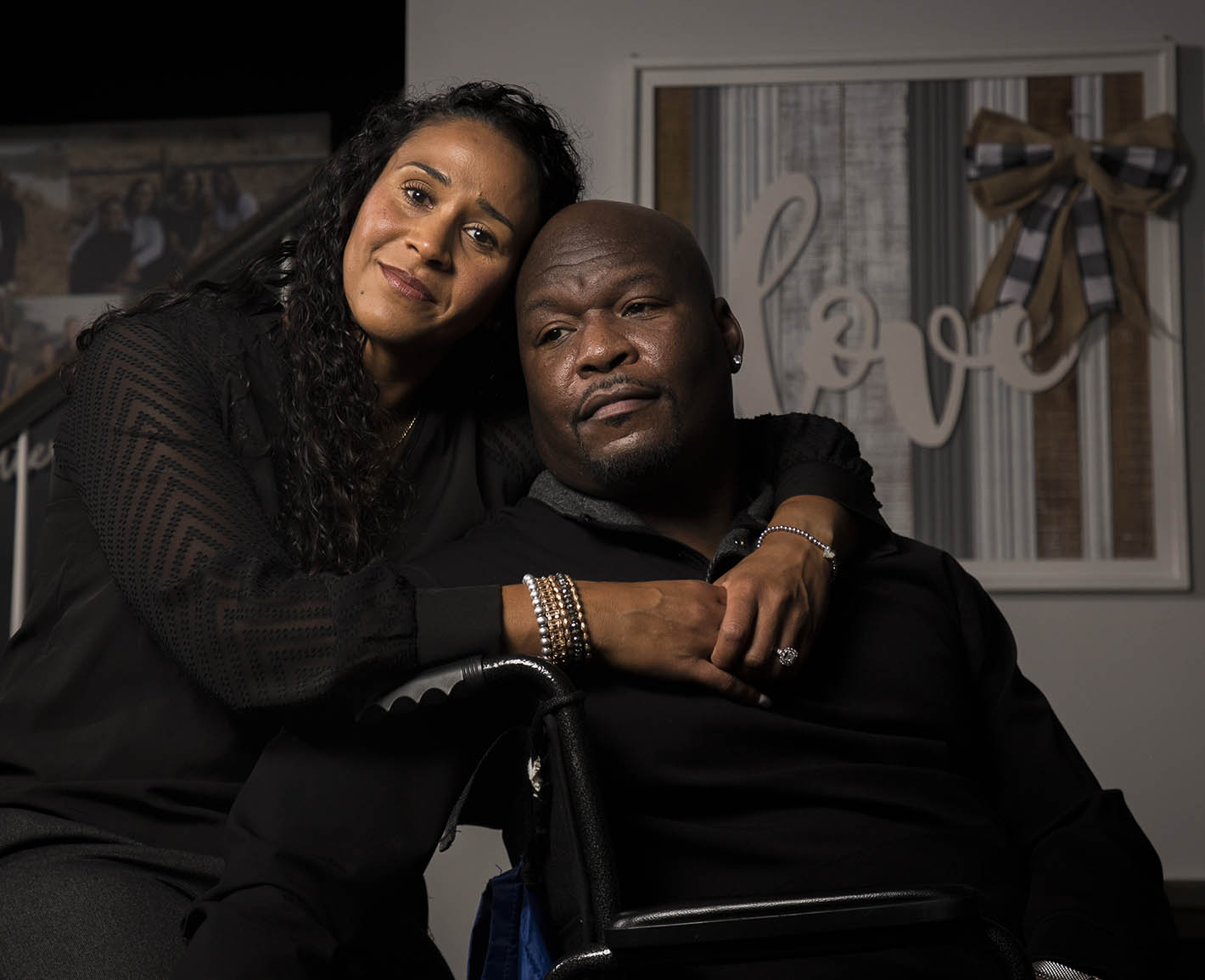Champions adjust.
That’s the fundamental lesson Marissa Young, the only coach Duke’s top-tier softball program has ever had, imparts to her players.
The unexpected will always come, “but how you respond to it is what matters most. You’re going to practice and train for that because you’re not going to be perfect.” You want to succeed? Respond to what happens, not what was supposed to happen.
“I preach to them all the time: We can’t be so tied to what we want and how things should go that we miss the opportunity to pivot and adapt to what the situation is calling for in that moment.” She gets the players to keep that in mind by practicing making errors. She has them purposely boot grounders, drop flies. “We call it the ‘Oh [Stuff] Drill,’” she says. “I think we’ve done that really well.”
“Really well” may understate the case. You may know that last year Duke softball had its most successful season ever. The team played its first games only in 2018; it has improved every year, and last year not only won the ACC championship but played in the Women’s College World Series. You may not know that it did so while Coach Young was running a version of the Oh [Stuff] Drill in her own life. And that the team response to the issues that beset her family was the season’s true takeaway.
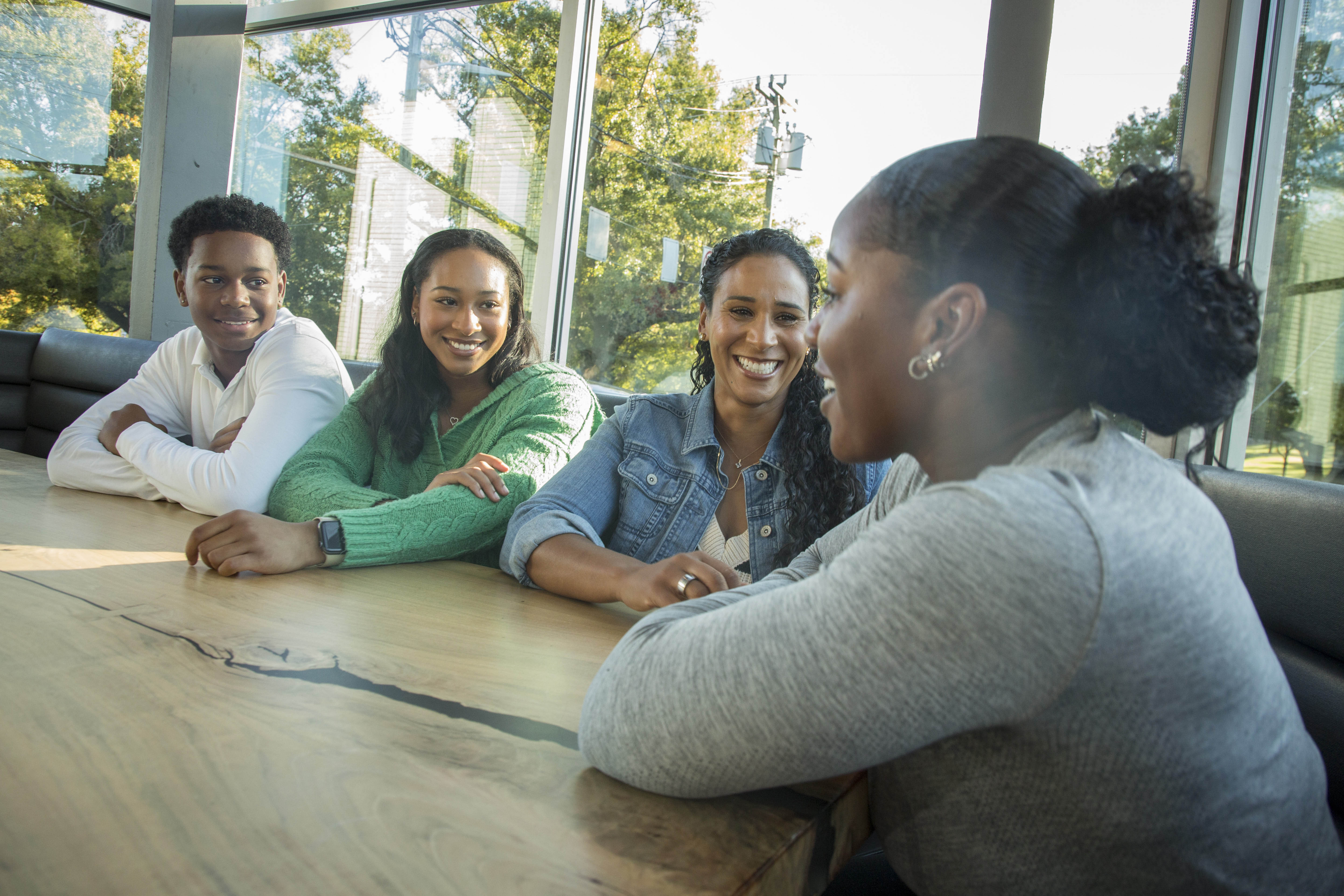
In May 2023, as the team was losing the Super Regional game that ended its season, Young looked out at the stands for James Lamar. Lamar is not only her husband and a friend to many of the athletes. He coaches the Lady Dukes, an 18-and-under travel softball team that many of the Duke team member had played for.
“By the fifth inning, I knew he wasn’t there, and something had to be off.” She assumed it was something with one of their four kids, but it was not. Lamar, who had been struggling with what he thought was pneumonia, had gone to the hospital. It turned out he had had a heart attack, and the family’s life was turning on a dime. Lamar spent weeks on a respirator and months in the hospital. He has had a heart and kidney transplant and more than two dozen surgeries. Currently using a wheelchair, he hopes to be on his feet again soon.
His journey of recovery, and the decisions faced by Young, have brought to the fore values that Young, Lamar, and everyone involved with the team say have changed their lives. “It really was a valuable opportunity for me to live out what I preach to my players,” Young says. “Of, you know, your value is not just about your performance and who you are as a player. You bring a lot more to the table. You have to learn what your strengths are and who you are as a person outside of softball.”
Mind you, Young doesn’t focus only on that emotional side of coaching. “Coach Young preaches all the time that it doesn’t matter what’s going on inside your life,” says junior infielder Aminah Vega. “Like, just get it done.” In fact, Vega chose Duke – and Lamar’s Lady Dukes before that – for just that discipline. She knew she wanted to play for Lamar when in her tryout he told her she was going to have to work a lot harder than she was used to. “I decided that’s exactly where I wanted to be,” she recalls.
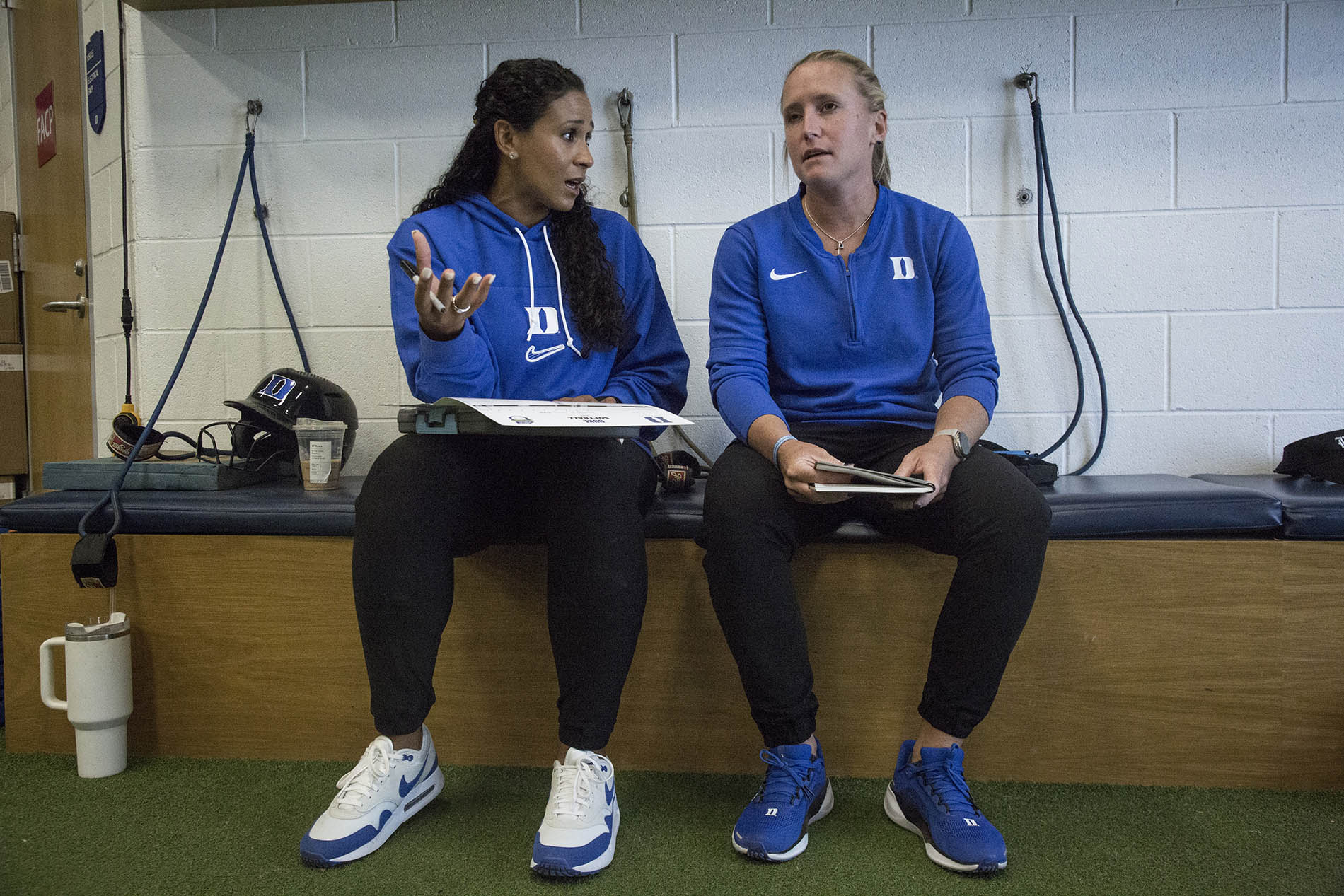
Lamar has not lost that fierceness. Health problems or no, he’s already back coaching. “Absolutely,” he says, laughing. “In a wheelchair. I just don’t want people to see me with sympathy. See me as the same strong person as before.” But he accepts that his health is a new challenge to rise to, and it requires change. “Living through what I’m going through now, there’s a positive side to this. It’s made me a better person – to value people and value different things about myself.” He thinks of moments in the hospital when he didn’t know whether he would see his family again. “The most invaluable lesson I will ever teach them is time. Because it’s one thing can’t nobody buy.”
Time with her team was something Young had to sacrifice. Managing Lamar’s care and the pair’s four children – one in college – meant Young missed most of the fall softball practices last year and had to run her own Oh [Stuff] Drill, though she’s kind of been running a version of it as long as she’s been coaching. She had her first head coaching gig at Concordia University Ann Arbor in Michigan, where “it was Division II and not a lot of resources.” She dragged the infield, managed the audiovisual technology and the lights at the field, ran the team’s social media. Then she came to Duke, at that point a school without a softball stadium or even a program. Letting assistant coaches help was a new experience for her, but letting go of expectations was what she constantly urged her team.
“And I had to learn that same lesson,” she says. During the first months of Lamar’s illness, she needed softball to be someone else’s main job; her focus was her husband and her children. “At the end of the day, that’s still my No. 1 priority, to be a great mother, but it’s also helped me figure out how to be a better mentor to my current players.”
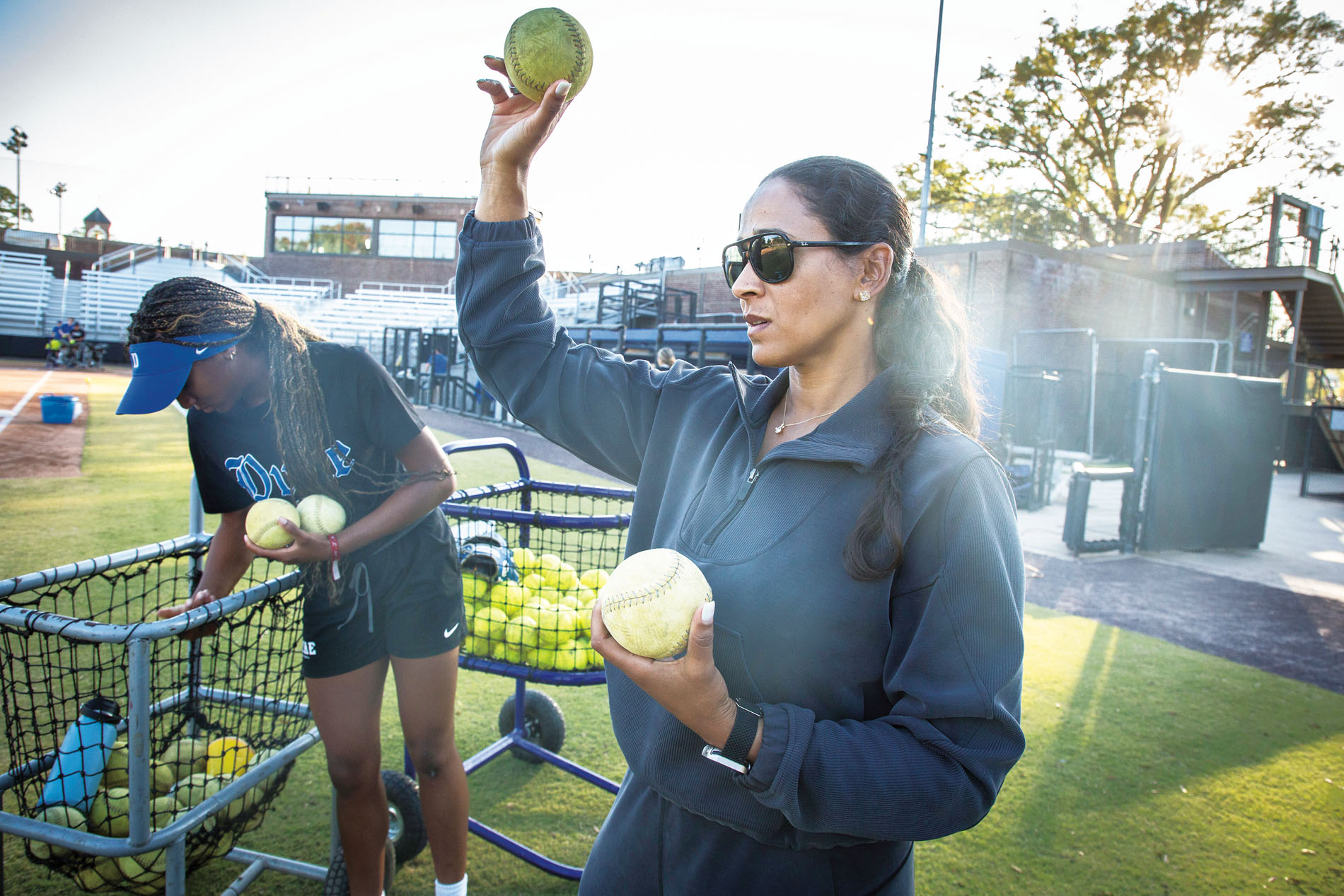
That whole-woman mentality brings players to Duke softball. “One of the key things that got me to Duke and made me want to recruit under Coach Young,” Vega says, “was because she emphasized that she didn’t want me to just be a great player; she wanted me to be a great woman.”
And with Young at its head, stepping up for each other is in the program’s DNA. Senior Kennedy Barron, now a student assistant coach, came to Duke to pitch in 2021, but heart issues landed her in Duke Hospital one terrifying night in her freshman year. “I had to go to the hospital at 2 a.m.,” she recalls. “And Coach Young came to visit me.
“In her pajamas.
“I didn’t know what time it was; I wasn’t even sure what was going on,” recalls Barron, who was away from family for the first time and suffering a health crisis. But her coach materialized at her bedside. “I was like, ‘Hello? Are you real right now?’”
So stepping up when Coach Young was sidelined was easy. Barron notes the team has a leadership council rather than a single captain. But when Coach Lamar got sick, “Even people outside that council really had to step up and learn how to self-govern. Like, ‘How am I going to conduct myself when people aren’t watching?’”
Associate head coach Olivia Watkins saw it. “The experience, obviously, was scary, but as a coach, I just saw a team that started to care for each other in ways I’ve never seen before – hold each other accountable. One of the really cool things to me about last season was just how the team prepared themselves and picked up Coach Young when she needed it the most. I love winning, I love all the accolades, but that, by far, was one of the really cool things that I’ve ever experienced in life.”
Young urges her players to see themselves as whole people, and “I had to learn that same lesson. Softball was out of the picture, so what was I going to do on a daily basis to still demonstrate who I am as a person and what’s important to me?” She did it by being both mom and dad to her kids, sleeping on couches and in hospital-room chairs. And she did it by letting others care for her – by allowing herself to need care, not just give it.
“We could have easily shut down,” says junior outfielder D’Auna Jennings, but instead, “we just did it. We knew that we were going [to the World Series] regardless.” She says they felt toward Young, “Yes, this is your program, but we have your back.”
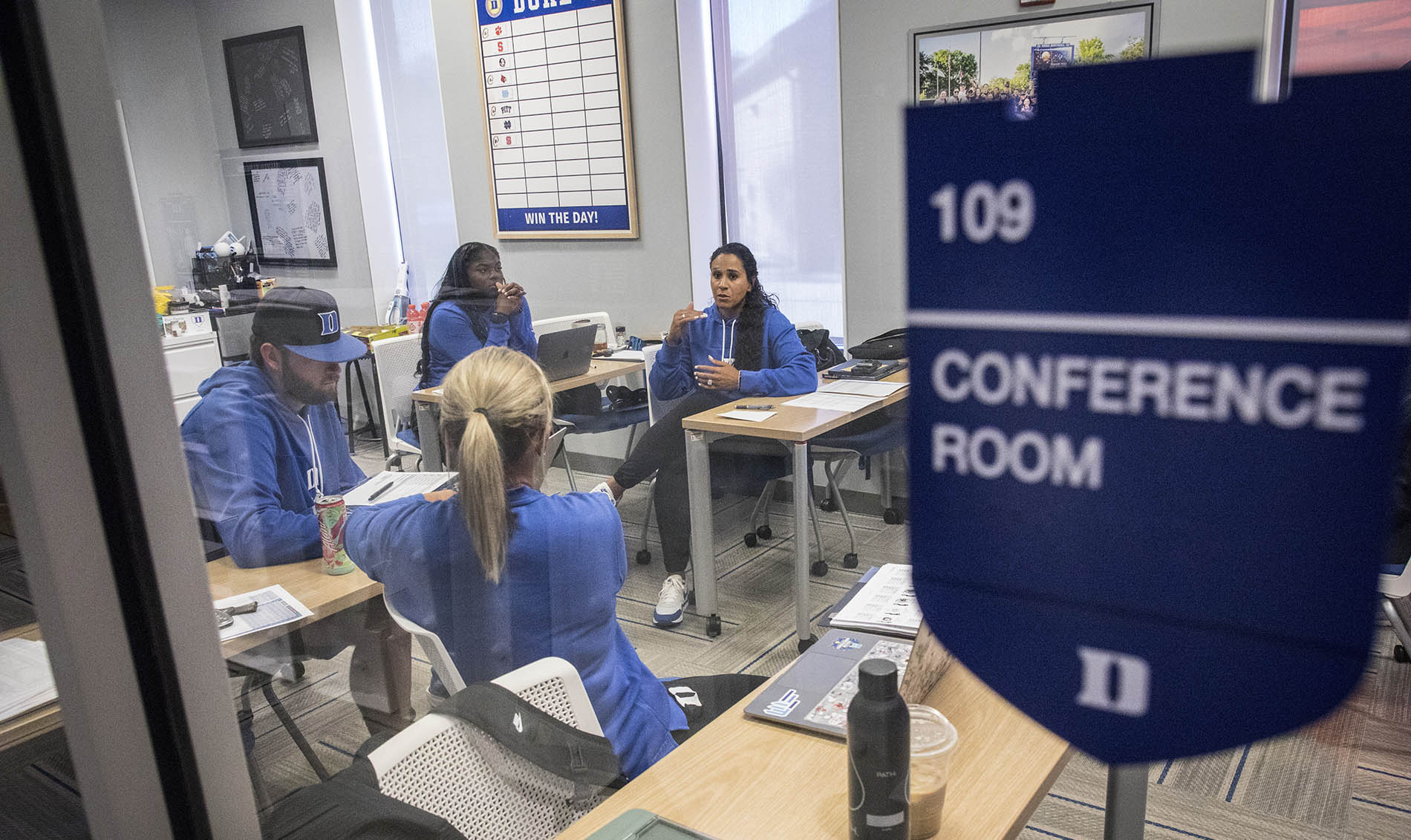
They managed their own needs, too, Vega says. “After practices, we would gather up in a circle and say one thing we’re struggling with, just so that we could be vulnerable with the team.” That starts with Young. “I try to be very vulnerable and authentic with my players,” she says, “Because one day, they’re going to be mothers and wives and leaders in their field.
“And so I want to be that model and mentor to them, where they can hopefully say, ‘I can do that,’ and when things come up, maybe remember back to how I handled situations and hopefully that helps them get through what they have coming.”
Duke softball is preparing for a 2025 season everybody hopes will be special. The team is special already, having reached the Women’s College World Series at a time when their coach faced overwhelming family issues. “The biggest lesson for me over the last year has just been keeping your priorities in order,” Young says.
“And I think when you do the right things for the right reasons, the outcome will take care of itself. That was a great lesson. Not just for me, but also hopefully for my players.”
And if the lesson didn’t quite land?
They’ll adjust.
